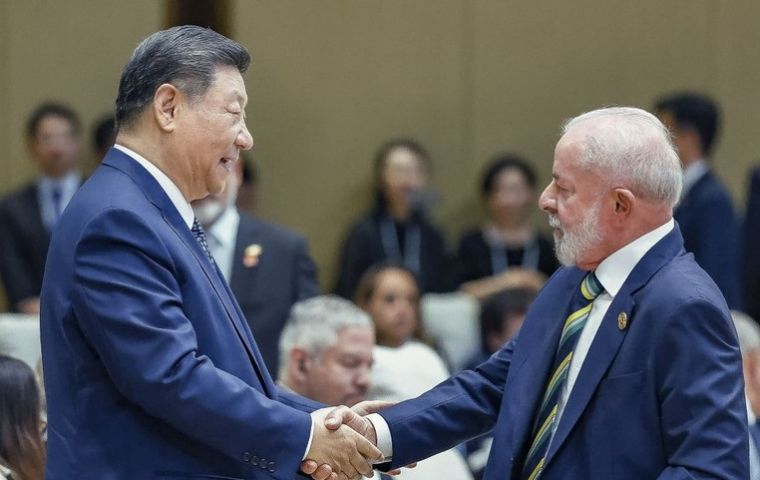MercoPress. South Atlantic News Agency
Brazil and China issue joint statements regarding ongoing world affairs
 The two declarations were issued after the meeting between Lula and Xi Jinping and other talks among high-ranking officials
The two declarations were issued after the meeting between Lula and Xi Jinping and other talks among high-ranking officials Brazil and China released two joint statements Tuesday following a meeting between Presidents Xi Jinping and Luiz Inácio Lula da Silva and other encounters in Beijing.
Overall, these documents addressed the ongoing war in Ukraine, a commitment to multilateralism and sustainability, a reform to the United Nations and its Security Council, economic cooperation, and a one-China stance.
The first statement called for dialogue between Moscow and Kyiv to end the war, while the second addresses multilateralism and the strengthening of sustainable actions to mitigate the harmful effects of climate change.
During his current visit to China, Lula has spoken repeatedly about the war in Ukraine and was heavily critical of Israel's actions in the Gaza Strip.
“Humanity is shrinking in the face of the atrocities committed in Gaza. There will be no peace without an independent and viable State of Palestine, living side by side with Israel. Only a reformed UN will be able to fulfill the ideals of peace, human rights, and social progress enshrined in 1945 by the Charter of San Francisco,” said Lula.
In their joint statement, Brazil and China welcomed Russian President Vladimir Putin's proposal this week to open peace negotiations while highlighting Ukrainian President Volodymyr Zelensky's reaction.
“The governments of Brazil and China hope that direct dialogue between the parties will begin as soon as possible, the only way to put an end to the conflict,” the document mentions, positively assessing “the recent signs of willingness to engage in dialogue and expressing their expectation that the parties will be able to reach an understanding that will enable the start of fruitful negotiations.”
In the opinion of the Brazilian and Chinese governments, it is necessary to find a political solution to the crisis in Ukraine “at its roots, with a view to a lasting and fair peace agreement that is ultimately binding on all parties”.
The second declaration deals with the search for peace and stability in the Middle East, including the Gaza Recovery, Reconstruction and Development Plan, adopted by the League of Arab States in March 2025.
The two countries called on the international community to “promote the continued and effective implementation of the ceasefire agreement and to alleviate the humanitarian crisis in Gaza”, in the search for a “definitive solution to the Israel-Palestine conflict.” They also reiterated their “support for the two-state solution, with an independent, sovereign and viable State of Palestine, living side by side with Israel, in peace and security, on the 1967 borders, including the West Bank, the Gaza Strip, and with East Jerusalem as its capital.” The document also rejected “the use of terrorism and all acts of violence.”
Brazil and China also pledged to work together to defend multilateralism, safeguard international equity and justice, and reject unilateralism, protectionism, and the quest for hegemony. In this regard, they advocated a fairer and more equitable international system and the peaceful resolution of any disputes.
A reform to the United Nations Security Council was also included in the document, citing the need to make the UN more democratic and representative.
“The Chinese side attaches great importance to the influence and role that Brazil plays in regional and international affairs and understands and supports Brazil's aspiration to play a greater role in the UN, including in its Security Council,” read the document.
In addition, it advocated comprehensive reform of the international financial architecture “to expand the influence of developing countries and their representation in international financial institutions.”
Brazil reiterated that it “firmly adheres to the principle of one China”, recognizing that “there is only one China in the world and that Taiwan is an inseparable part of Chinese territory.” The South American country also praised Beijing's efforts “to achieve peaceful national reunification,” which was received with “great appreciation” by the Chinese side.
The document criticizes the so-called tariff and trade wars [as implemented by the United States after the inauguration of Donald Trump], stating that protectionism does not respond to current challenges.
In addition to advocating for the strengthening of cooperation between countries in the Global South, the declaration calls for all countries to pay more attention to issues related to human development, with a special view on reducing poverty and in favor of measures for education, health, and sustainable development.
It also highlights the partnerships between Brazil and China in initiatives and projects that cover the areas of financial cooperation, health, infrastructure (roads, railways, and ports), artificial intelligence, science, technology and innovation, human resources training, the environment, renewable energies and ecological transition, and the naval sector.
Brazil and China also jointly advocate global governance in cyberspace, as well as combating disinformation on the internet, to “promote a cyberspace that is open, secure, stable, accessible, peaceful and interoperable.”
Both countries also addressed cooperation between scientific research institutions and companies in the agricultural area to promote technological innovation, including biotechnology and social development. (Source: Agencia Brasil)




Top Comments
Disclaimer & comment rulesCommenting for this story is now closed.
If you have a Facebook account, become a fan and comment on our Facebook Page!